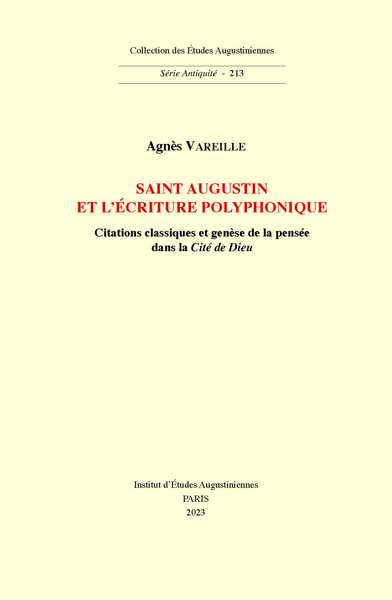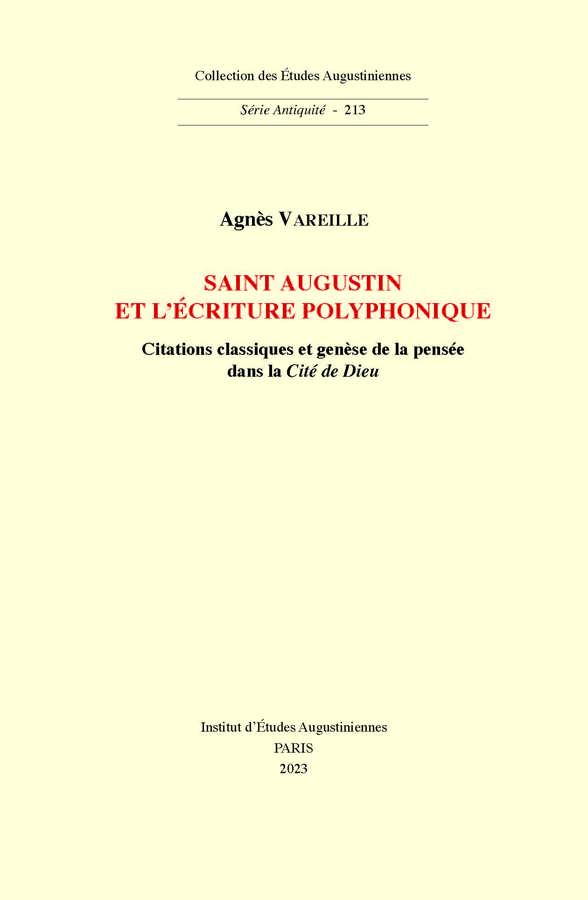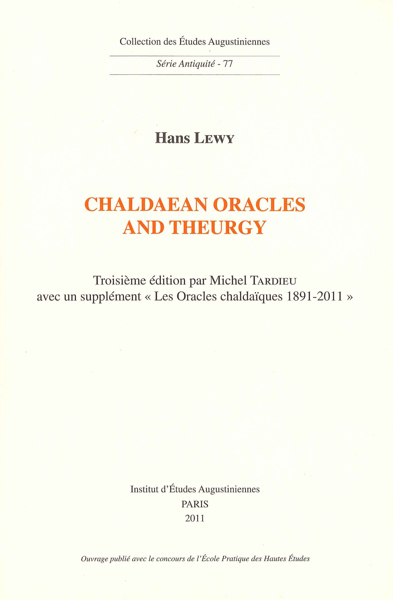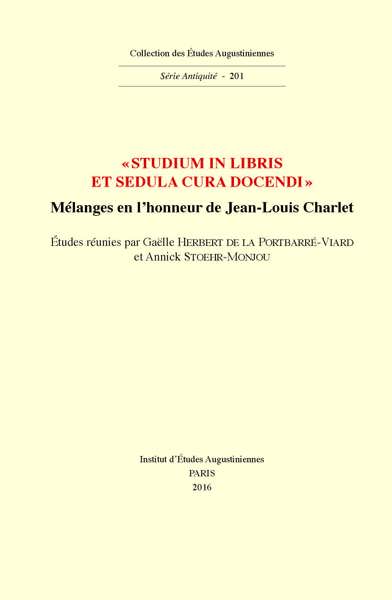
Saint Augustin et l’écriture polyphonique
Citations classiques et genèse de la pensée dans la Cité de Dieu
Agnès Vareille
- Pages: 464 p.
- Size:165 x 245 mm
- Language(s):French
- Publication Year:2023
- € 61,61 EXCL. VAT RETAIL PRICE
- ISBN: 978-2-85121-328-0
- Paperback
- Available
“Agnès Vareille now brings a more systematic method and a broader framing of the issues to revisit the questions of [classical] presence, influence, and absence [...]. [...] she has the discipline to concentrate explicitly on ‘citations’ – not references, not allusions, not transposition of ideas, but on the text of DCD itself and the explicit, material, concrete ways in which it re-presents the classical in Augustine’s context. Hence her subtitular assertion of écriture polyphonique – the deliberate creation of a text in which the voices of the classical authors are deployed to be heard and respected and reacted to. Almost a hundred pages of appendices present the evidence with great care and offer a reference tool that others will, or at least should, use with profit.
The effect of taking this approach is to do justice to the actual text of DCD in a way that’s not been done before. Her work makes me conscious of just how much of our modern discourse about DCD has been about what’s going on not just in Augustine’s mind but in our own minds as scholars, preoccupied by issues of influence, tradition, and ideology that DCD evokes in us in a way that makes the text, and the actual Augustine on display in the text, of secondary importance. This approach enables her to do justice to the choices that Augustine made with a level of precision that is refreshing to see. The book should be read with attention by all readers of DCD but also, I would say, all readers coming to make their way through any part of the Augustinian forest, so important is DCD and so effective is Vareille. [...] the essential and refreshingly radical interpretative strategy with which she succeeds.”
(James J. O’Donnell, in Bryn Mawr Classical Review 2024.09.34)
"Dimostrare questa ampiezza d’orizzonte della riflessione agostiniana utilizzando – come ben fa A[gnès] V[areille] – categorie stilistiche e compositive rappresenta un’acquisizione critica matura, nell’insistere debitamente su un aspetto fondamentale dell’Agostino comunicatore che, al pari della profondità dottrinale (e della santità ‘esperienziale’), giustifica la precocissima fortuna del suo magistero." (Fabio Gasti, in Rivista di Filologia e di Istruzione Classica, 153/1, 2025, p. 267)
Using the tools of contemporary linguistics, the present book studies the Classical quotes found in Augustine’s City of God – mainly from Cicero, Sallust, Varro, and Virgil – and tries to show how they fully contribute to the development of his thought. This study is divided in three stages, so many as there are connections to Augustine and his work. It first tries to show how exactly the quotes appear in the text – a notion defined as ‘the copresence of two statements’. The second part examines the polyphony created in the work by these secondary voices, which are analysed in close relation with the book’s context of reception. It finally seems that, far from encouraging digression, this ‘poetics of otherness’ contributes to the development of a discourse whose order acts as a guarantee of truth, and is therefore at the heart of the book’s apolegetic intention. Thus, being nurtured by an internalised and theatralised dialogue, Augustine’s text makes fruitful use of these sources as a means to draw – at least in part – the conclusion that pagan philosophy is an aporia. This study includes an appendix and a transcription of the Classical quotes found in the City of God, along with their contexts and philological annotations.
L’ouvrage étudie grâce aux outils de la linguistique contemporaine les citations classiques présentes dans la Cité de Dieu, principalement celles de Cicéron, Salluste, Varron et Virgile, et entend montrer qu’elles participent activement à l’élaboration de la pensée. Divisée en trois temps, comme autant de rapports d’Augustin à ces textes, l’étude s’attache d’abord aux modalités d’apparition des citations, notion définie comme « coprésence de deux énoncés ». La seconde partie examine la polyphonie créée dans l’œuvre par ces voix secondes, analysées en relation étroite avec leur contexte d’accueil et de réception. Il apparaît enfin que cette « poétique de l’altérité », loin de favoriser la digression, contribue à l’élaboration d’un discours dont l’ordre garantit la vérité, et se trouve donc au cœur du dessein apologétique de l’œuvre. Ainsi nourri d’un dialogue intériorisé et théâtralisé, le texte augustinien tire profit des ambigüités de ces textes pour conclure, partiellement du moins, à l’aporie de la philosophie païenne. L’étude comporte en annexe un relevé des citations classiques dans la Cité de Dieu, insérées dans leur contexte et pourvues d’annotations philologiques.
Introduction
Première partie : Les textes classiques dans la Cité de Dieu
Chapitre I. Formes et fonctions des emprunts classiques dans la Cité de Dieu
Chapitre II. Augustin lecteur
Deuxième partie : La Cité de Dieu, un discours polyphonique
Chapitre III. Augustin en dialogue avec ses contemporains
Chapitre IV. La citation dans la Cité de Dieu : une poétique de l’altérité
Troisième partie : Les textes classiques et l’ordre du discours
Chapitre V. L’ordre mis à l’épreuve de la polyphonie
Chapitre VI. Disputatio de re publica, la République en question aux livres II et XIX de la Cité de Dieu
Conclusion
Annexes
Indices
Bibliographie
Index augustinien
Index des citations classiques
Index des notions




